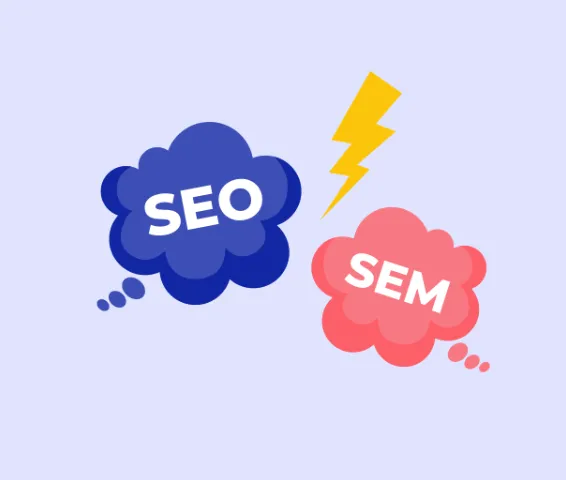Search engines play a central role in how Singaporeans discover businesses online. Whether someone is looking for a marketing agency in Raffles Place or a café in Jurong, chances are their journey starts on Google. For local companies, the big question is this: should you focus on SEO (Search Engine Optimization), SEM (Search Engine Marketing), or a mix of both?
The truth is that neither strategy exists in isolation. While SEO builds long-term organic visibility and credibility, SEM delivers fast, paid exposure. Businesses that combine them often see stronger results than those relying on just one. In fact, studies show that integrated search campaigns can achieve significantly higher conversion rates than single-channel approaches.
SEO vs. SEM: Understanding the Difference
Although they share the same goal—getting your brand noticed—SEO and SEM operate very differently.
- SEO: This is the process of optimizing your website and content to appear in Google’s organic results. It involves keyword research, technical improvements, and creating valuable resources that earn authority over time. Think of it as planting seeds that grow into a steady source of traffic. While SEO usually takes 3–6 months before noticeable results appear, it compounds over time and builds lasting value.
- SEM: This uses platforms like Google Ads to buy visibility instantly. You bid on keywords, write ad copy, and pay whenever someone clicks your ad. SEM is perfect for immediate exposure, product launches, and targeted campaigns, but the moment you stop funding ads, traffic disappears.
Both strategies are powerful, but their timelines and outcomes differ. SEO is a marathon; SEM is a sprint.
Cost and ROI: What to Expect
Budgeting for SEO and SEM requires different mindsets.
- SEO investment: Businesses typically spend thousands each month on SEO through content creation, technical optimization, and link building. While upfront costs may seem high, the long-term payoff is impressive. Once your pages rank well, the ongoing traffic is essentially free. Many companies report higher close rates from SEO leads compared to other channels.
- SEM investment: Paid campaigns offer immediate results but require constant funding. The cost per click varies—affordable in some industries, sky-high in competitive ones like legal services. Small and medium businesses often spend anywhere from $1,000 to $10,000 monthly. The upside? You control your budget, targeting, and timing with precision.
When comparing ROI, SEO usually outpaces SEM in the long run, while SEM delivers instant wins. A blended approach often yields the best balance of short- and long-term returns.
Timelines: When Results Kick In
One of the most important differences between SEO and SEM is how quickly you see results.
- SEO milestones:
- Months 1–2: Foundation work like technical audits and content planning.
- Months 3–6: Early ranking improvements and gradual traffic increases.
- 12+ months: Strong organic performance with compounding authority.
- SEM milestones:
- Day 1: Campaigns go live and generate clicks immediately.
- Week 1: Early adjustments and performance data roll in.
- Month 1 onward: Campaigns stabilize, scale, and deliver steady ROI.
Many businesses launch SEM for quick traction while SEO efforts mature in the background. This hybrid approach accelerates growth while building long-term stability.
When SEO Makes Sense
SEO is ideal for companies that:
- Have an existing website ready for optimization
- Operate in competitive fields where trust and authority are critical
- Prefer long-term, sustainable growth over constant ad spend
- Want to build a reliable source of inbound leads
For example, a Singapore law firm benefits more from SEO, since clients often research extensively before making decisions. Ranking organically builds credibility that paid ads alone can’t replicate.
When SEM Shines
SEM is particularly effective for:
- Immediate lead generation or product launches
- Time-sensitive promotions and seasonal campaigns
- Testing new markets or keywords before committing to SEO
- Businesses entering competitive niches with strong incumbents
An e-commerce store, for instance, may run SEM ads during holiday sales to drive quick conversions and capture demand spikes.
Why a Hybrid Strategy Wins
The strongest digital marketing strategies rarely treat SEO and SEM as rivals. Instead, they use both in complementary ways. Appearing in both organic and paid results can dramatically increase overall visibility and click-through rates.
Research also shows that businesses running integrated campaigns often enjoy lower customer acquisition costs and higher conversion rates than those depending on one channel alone.
Key Metrics to Track
Measuring success correctly is crucial.
- SEO KPIs: organic traffic growth, keyword rankings, conversion rates, backlink quality, and site speed.
- SEM KPIs: cost per click, click-through rate, conversion rate, Quality Score, and return on ad spend.
Tracking these together provides a clearer picture of your overall marketing performance and helps optimize future investment decisions.
Singapore’s Unique Landscape
The Singapore market presents specific opportunities:
- Local intent: Nearly all consumers here use search engines to find local businesses, and many act within 24 hours.
- Mobile-first behavior: With one of the world’s highest smartphone adoption rates, mobile optimization is non-negotiable for both SEO and SEM.
- E-commerce growth: Online shopping continues to expand rapidly, making search visibility vital for retailers of all sizes.
Final Thoughts
For Singapore businesses, the real decision isn’t SEO versus SEM—it’s how to combine them effectively. SEO lays the foundation for sustainable growth, while SEM provides the agility to capture opportunities instantly.
Companies that balance both approaches not only maximize their visibility but also future-proof their digital marketing against changing algorithms, shifting markets, and evolving customer behavior.
If you want to thrive in Singapore’s competitive digital space, the smartest move isn’t to choose one—it’s to integrate both.
